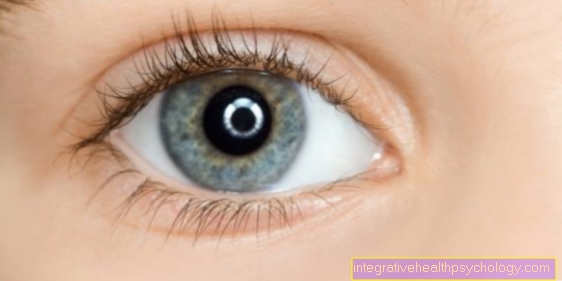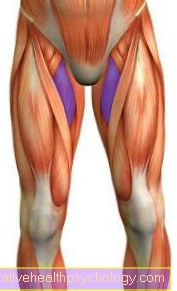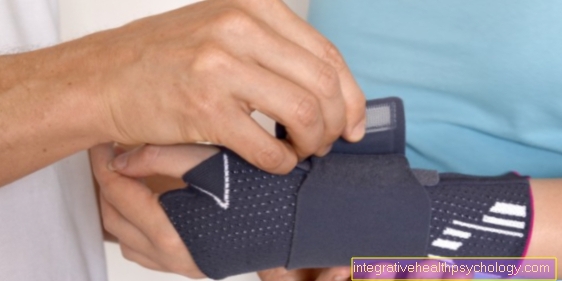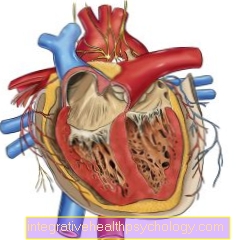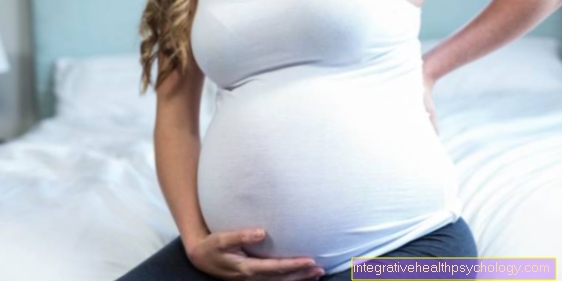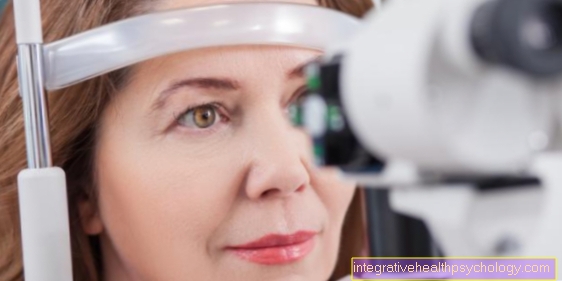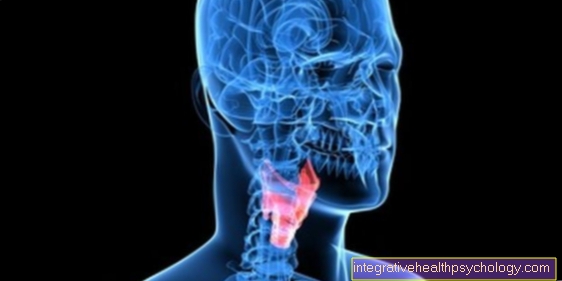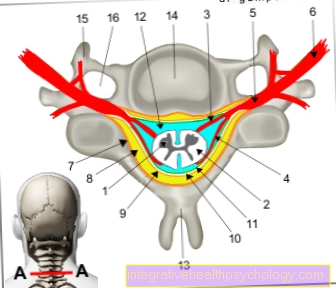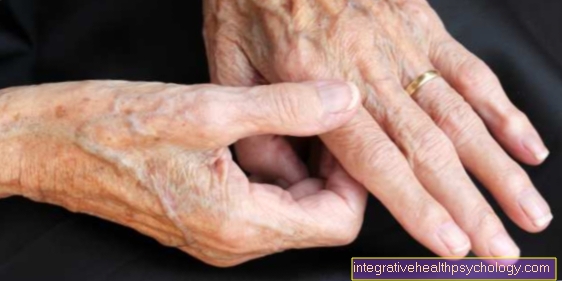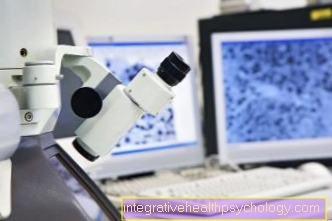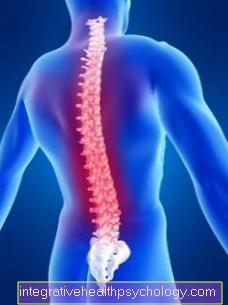Intestinal bleeding
introduction
A Intestinal bleeding can be a symptom that is under many different diseases can occur. These can range from very mild and harmless to serious illnesses.
The most common cause of an intestinal bleeding is a Hemorrhoid ailments. These are expanded vascular cushions of the rectum, which over time mainly after defecation can bleed.

Intestinal bleeding can show itself in very different ways. It can range from slight traces of blood on the toilet paper to large amounts of blood in your stool. The place of origin of intestinal bleeding is also very different. The bleeding can be directly at the anus, i.e. the anus, or it can occur in the entire intestinal tract. A bleeding can theoretically have its origin at any point in the small intestine as well as in the large intestine. Any kind of bleeding in this area is called intestinal bleeding.
Even if one is most likely to assume a harmless cause such as a hemorrhoidal disease, there may always be a possible behind it Cancer stuck. Therefore, it is very important to consult a doctoras soon as blood is found in stool or toilet paper.
Symptoms
A Intestinal bleeding can have many different causes. Depending on the type of disease, you can choose between bright red bleeding, or blood deposits on the stool, and rather dark red blood differ in bowel movements.
Depending on the disease, there may be other bleeding in the intestine Symptoms like for example stomach pain or Pain and Itching around the anus. Other additional symptoms can also be a creeping one fatigue such as Slackness be.
Intestinal bleeding can also be associated with Changes in bowel movements occur and for example with Diarrhea accompanied.
If an intestinal bleeding occurs due to a serious cancer like one Colon cancer, so one Colon tumor further symptoms may occur. Typical tumor symptoms can appear as Night sweats, unwanted weight loss, Slackness or fever present. Due to the tumor, it can also become chronic Constipation and Laxative problems come.
Should inflammatory bowel disease, how Crohn's disease or Ulcerative colitis, which are the causes of an intestinal bleeding, one can often see an increased occurrence of Diarrhea observe. These diarrhea can get along with Constipation problems alternate.
Diagnosis
When an intestinal haemorrhage occurs, as with any other disease, there are a multitude of symptoms diagnostic possibilities.
As always, the first step is to ask the patient about his or her own Main complaints, the temporal course, possible additional symptoms and Changes in stool and Eating habits.
The next action is then one physical examination with special attention to the stomach. In the case of intestinal bleeding, this is also an additional examination Palpation of the rectum finger to look after Bleeding, Mucosal changes or Tears to look in the area of the sphincter. Even if this examination is often very uncomfortable and filled with shame, it is still necessary if an intestinal bleeding occurs.
The physical examination is followed by the use of technical devices such as the Ultrasonic. Here you can go to, for example free fluid in the abdomen or after Tumors search. As the next step in diagnostics, there is the option of using Computed Tomography or Magnetic resonance imagingto look at the structures in the abdomen and look for the cause of the intestinal bleeding.
In order to look for sources of bleeding, a so-called Colonoscopy are used. this is a Colonoscopy, which involves inserting a camera through the anus and advancing it along the colon. Here you can look through the camera as possible Changes in the mucous membrane and after Sources of bleeding search.
causes

The Causes of intestinal bleeding can range from harmless illnesses to serious cancers.
The more simple, harmless diseases that can cause intestinal bleeding include, for example:
- hemorrhoids,
- a Anal fissure
- or Vascular malformations.
hemorrhoids arise mainly in patients with sedentary activities or chronic constipation. This leads to an expansion of the vascular cushion on the end of the rectum, which occurs in the context of chronic constipation and constant pressing may cause bleeding when defecating. At the same time, it often happens in this area Pain as well as to itching.
Also one Anal fissure can lead to intestinal bleeding. An anal fissure is a Crack in the area of the anus. It often arises in the context of chronic constipation or through very hard bowel movements. Constipation or the very hard stool then lead to the tearing of the mucous membrane at the exit of the anus. The anal fissure is particularly noticeable severe pain when defecating, but also through an intestinal bleeding.
The cause of an intestinal bleeding can also be a so-called Proctitis be. this is a Inflammation in the anal areawhich in most cases is associated with pain in the anal region. It often arises from the transmission of STDs how gonorrhea or the syphilis. But also inflammatory bowel disease can cause proctitis. In addition to the intestinal bleeding or the bloody secretion from the anus, proctitis, as with hemorrhoids, leads to one itching.
Another disease that can lead to intestinal bleeding is the so-called Diverticulitis. Elderly people are mostly affected. This is Protrusions of the intestinal mucosa through the muscular layer of the intestinal wall. In these protuberances there can be a Accumulation of bowel movements come. These buildups can become infected, become inflamed, and cause pain and intestinal bleeding. A pure protuberance of the mucous membrane is called Diverticulosis and usually does not lead to any intestinal bleeding or pain. First one inflammationthen one of the above Diverticulitis power can besides bleeding at the same time Lower abdominal pain condition.
Also a Duodenal ulcer can cause intestinal bleeding. Of the Duodenum is the part of the small intestine that connects directly to the stomach. Just as in the area of the stomach, also in the area of the duodenum, medically Duodenum called, Ulcers arise. Initially, these usually only cause pain, which is mainly as Fasting pain expresses. If the ulcer of the small intestine is not treated, it can develop intoeat“And may encounter a blood vessel there. This can lead to intestinal bleeding.
Another cause of intestinal bleeding is when one occurs inflammatory bowel disease again Ulcerative colitis or that Crohn's disease. Ulcerative colitis is a chronic inflammation that primarily affects the intestines. The infestation of ulcerative colitis begins in the area of the rectum and then runs continuously towards the mouth. In contrast, it affects Crohn's disease different sections of the intestine with healthy intestinal parts in between.
Also Cancer of the intestines can lead to intestinal bleeding. The most common form of cancer of the intestine is the so-called colon cancer, also known as Colon cancer is known.
Read more on the subject here: Colon cancer symptoms
Bright red blood
Bright red blood on toilet paper or as a deposit on the bowel movement can be a sign of existing hemorrhoids be. They are enlargements of the so-called arterio-venous vascular pad in the area of the anus. By Connective tissue weakness, chronic constipation or sedentary activities they can arise or worsen.
Depending on the symptoms, the hemorrhoids can be in different stages to be grouped. especially the Initial stages are often associated with intestinal bleeding. The patient usually first notices bright red blood, which is visible on the toilet paper after a bowel movement. In the subsequent stages it also comes to Pain, Burn such as itching. In adulthood, more than half of all people have hemorrhoids.
(Read more on the subject here: hemorrhoids.)
Intestinal bleeding while taking diclofenac
Diclofenac belongs to the group of nonsteroidal anti-inflammatory drugs (NSAID). It becomes the Treatment of pain and inflammation used.
A disadvantage of this group of drugs is that although it is used for pain and inflammation therapy, it is also used for stomach- and Attacks the intestinal mucosa and so too Ulcers can lead in this area. For example, these side effects when taking diclofenac (and most other non-steroidal anti-inflammatory drugs) can lead to intestinal bleeding. This bleeding may be mild or severe and may be felt by the patient when they pass a bowel movement.
Read more about the topic here: Diclofenac side effects.
After a bowel movement
It is coming after defecation bleeding in the intestine can have several causes. Usually, harmless diseases are more likely to be the cause.
Many patients suffer from chronic constipationas they are little fiber and feed frequently throughout the day drink too little. Because of this, they often have irregular and often tough Bowel movement. This fact leads, among other things, to the fact that it is within a Hemorrhoid disease and one Anal fissure bleeding in the intestines can occur. If, in the course of time, the vascular cushions in the area of the rectum expand, these can of course burst in the case of hard stool and the associated increased straining and lead to noticeable intestinal bleeding after the stool.
Read more about the topic here: Constipation.
Another cause of intestinal bleeding after a bowel movement is that Anal fissure. It is also often caused by the presence of chronic constipation and hard stools. This tears the mucous membrane in the area of the external sphincter muscle. If this does not heal in the acute stage, it can develop into a chronic anal fissure which possibly operational needs to be treated.
Intestinal bleeding in children

Also at Children intestinal bleeding may occur. Even with children, this has mostly harmless reasons. Children, like many older adults as well, often tend to chronic constipation (Also read: "Constipation in Children"). The hard stool, combined with the increased straining, can cause the mucous membrane in the area of the anus to tear and lead to a Anal fissure leads. This results in what appears to be intestinal bleeding and bright red blood on the toilet paper.
Another cause can be cchronic inflammatory bowel disease be. It can also occur in children Ulcerative colitis and Crohn's disease come. These diseases can lead to intestinal bleeding in children. Usually this occurs more in the form of bloody-greasy diarrhea on.
If there is blood in a child's stool that is spilled at the same time severe abdominal pain such as Vomit complains, the cause may be Intussusception of the child's bowel be. Intussusception is an invagination of parts of the intestine. Most of the time, part of the small intestine is everted into the large intestine, which causes the corresponding symptoms.
Endometriosis
Under Endometriosis one understands a disease in which there is to Settlement and dispersal of mucosal cells from the uterus comes. These can lie on the surrounding tissue such as the ovaries, fallopian tubes, urinary bladder or the intestines.
Similar to the normal lining of the uterus, they are subject to this Estrogen levels. From this it can be concluded that these cells are also the female cycle accordingly on and means Menstrual period dismantle again.
In the so-called Intestinal endometriosis uterine lining cells migrate into the intestinal wall. Next cyclical pelvic pain it can also be done regularly Painful bowel movements come. At the same time, endometriosis can lead to cyclical intestinal bleeding, i.e. regular and parallel bleeding. Endometriosis can also lead to adhesions in the abdomen. This can also cause abdominal pain.
treatment
The causes of intestinal bleeding are as different as they are therapy.
The patient suffers hemorrhoids so can initially be a conservative therapy attempt to be started. This includes, among other things, a high fiber diet, Weight loss or increased physical stressto stimulate bowel movements. There are also several Anoint and Creamswhich, however, only alleviate the symptoms and do not treat the cause.
As the next level of treatment for hemorrhoids one can use the enlarged vascular pads tie off or you sclerosis. Sclerotherapy in this case means trying to use Cold therapy or Infrared coagulation to make the tissue shrink scarred.
As a last option of therapy comes one OP in question.
Read more about the topic here: "How to Treat Hemorrhoids Successfully".
If there is an intestinal bleeding due to a Anal fissure, so there is both the possibility of conservative as well as the operative treatment. The most important thing here is a good one Stool regulationso that constipation and hard bowel movements are avoided. Additionally can pain reliever such as anti-inflammatory ointments be used.
If the tear in the sphincter area still does not heal, the only thing that helps is the possibility of operative treatment.
Is a Ulcer of the duodenum The cause of the intestinal bleeding, the treatment looks almost like a stomach ulcer. As the main cause of the ulcer colonization with a certain bacterium is, the therapy includes the removal of the bacterium by means of a Combination of different antibiotics first of all.
If an ulcer occurs due to the Taking of Diclofenac or similar non-steroidal anti-inflammatory drugs should occur, these immediately discontinued become.
A Diverticulitisthat leads to intestinal bleeding are treated primarily with Food leave for a few days in combination with a antibiotic therapy. Should the protuberances tear (Diverticulum), what is called a perforation in medicine is one OP the treatment of choice.
Also read more on the topic: "Diverticulitis Surgery".
Is it because of a Cancer in the intestinal area to an intestinal bleeding must first be a histological Examination (an examination of a tissue sample) is carried out so that one can clarify around what kind of cancer it is about. Surgery and removal of the affected area are one treatment options. In addition, a chemotherapy respectively.
Also read more on the topic: "Colon Cancer Therapy".
Further topics
You might also be interested in the following topics:
- Colonoscopy
- Blood in the stool
- Gastrointestinal bleeding
All internal medicine topics can be found at: Inner A-Z.




